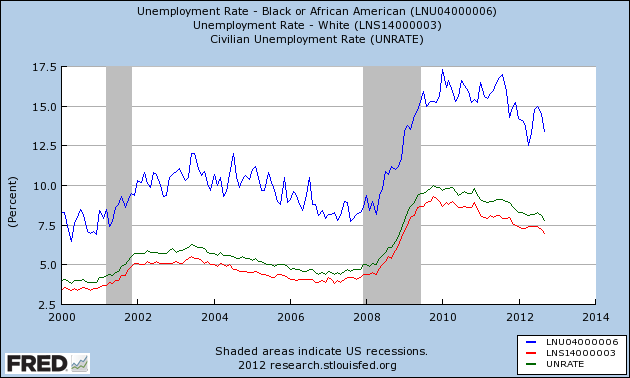Mike Konczal has a good piece in the American Prospect about the coming possibility of full employment and the monetary policy battles on the horizon. Central to Konczal’s piece is the debate over the non-accelerating inflation rate of unemployment (NAIRU). In lieu of giving a full explanation of NAIRU, it suffices here to simply say that the Federal Reserve may believe that it is impossible to go below (for instance) 5% unemployment without risking accelerating inflation. If the Fed believes this, it will not let the unemployment rate drop below that level, and will tighten monetary policy if the rate does so.
Consider the consequences of this for racial justice. Generally, the white unemployment rate is below the overall unemployment rate and the black unemployment rate is above it:

If the Federal Reserve is committed to not allowing the overall unemployment rate to fall (as they would be if they believed it was at NAIRU), then the only way for the black unemployment rate to fall is if the white unemployment rate rise. This is not technically true of course because there are other races, but we can say generally: the only way to reduce the unemployment rate of a group with a higher-than-overall unemployment rate is to increase the unemployment rate of another group. Under NAIRU-sensitive monetary policy that aims to keep the unemployment rate from falling, this is a mathematically unavoidable conclusion.
To put it another way, jobs literally become zero-sum under those conditions. The only way an unemployed person can get a job is if an employed person loses one. Thus, logically speaking, racial justice advocates aiming to bring the unemployment rate of people of color down must also be aiming to bring the unemployment rate of white people up. They need to be aiming to replace employed white workers with unemployed people of color, at least in aggregate. That’s a conclusion required by the math, but it is one I have never seen anyone ever admit. This conclusion seems to have pretty substantial consequences for how we think about social policy, activism, and racial justice struggles, among other things.